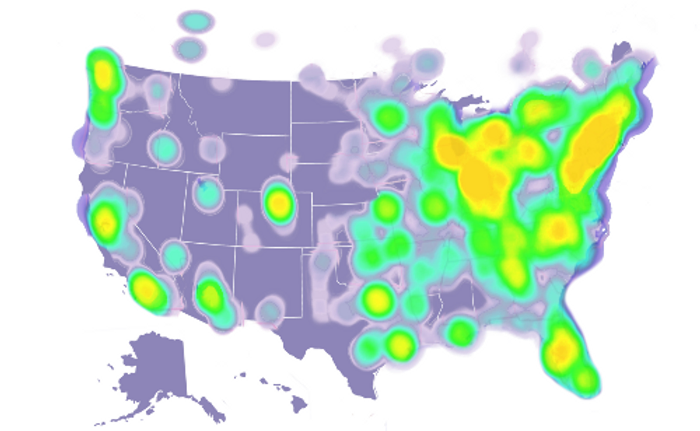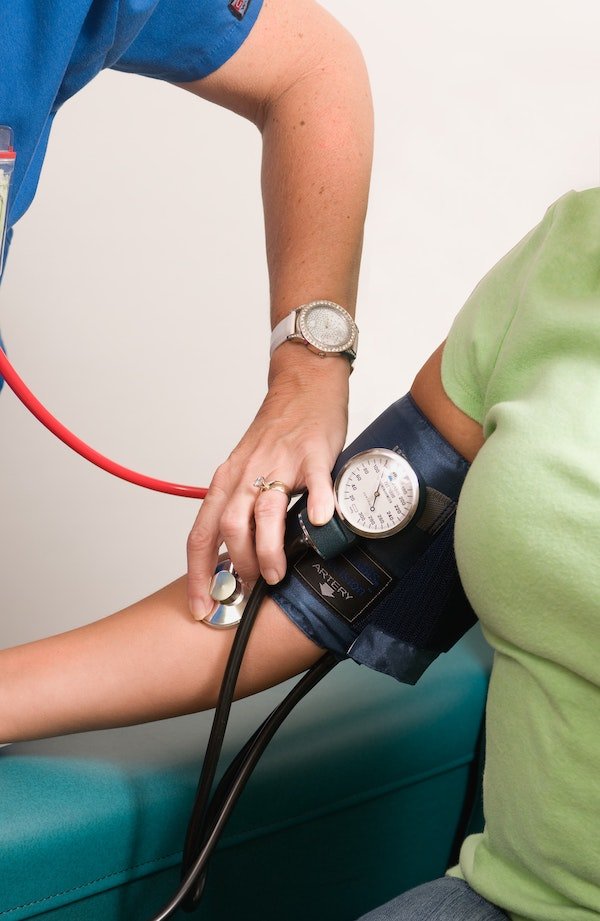Research Partnerships
We welcome the opportunity to partner with researchers and pharmaceutical companies to drive new and better treatments that improve the quality of life for patients.
Ongoing
Research
Projects.
AIH Clinical Trials and Studies. Learn more.
AIHA patient registry: launched in June 2021. Learn more.
AIHA focus groups: the patient experience of AIH, 2020-2021
The GRACE Study at Indiana University: genetic and environmental risks of autoimmune hepatitis. Member recruitment for immune cell sample collection
Biospecimen recruitment: translational research
North American AIH Consortium (Indiana University, University of Pennsylvania, and Mayo Clinic): consortium partner.
Research
Opportunities.
We welcome the opportunity to partner with researchers and pharmaceutical companies that seek to discover new and better treatments for AIH and improve the quality of life for patients.
Overview of Our Membership
More than 5,000 members

88% Female

12% Male
Distribution and Density of AIHA Members in North America

Papers Published.

The Latest Research on Metabolic Conditions in AIH Patients
A research collaboration between Indiana University and University of Pennsylvania (which included members of the AIHA Medical Board and our AIHA Executive Director) has shed some light on the burden of metabolic conditions (type 2 diabetes, high blood pressure, high cholesterol, and obesity) in autoimmune hepatitis (AIH) patients and how these disorders may impact AIH treatment. This is particularly important since many AIH patients are prescribed steroids, which can increase the risk of metabolic conditions.
Data collected in the study showed that over half of patients already had at least one of these conditions at the time of their AIH diagnosis. Unfortunately, after one year of AIH diagnosis, nearly two-thirds of patients had developed a metabolic condition. On top of this, having a metabolic condition was associated with not having excellent control of AIH liver-related inflammation by one year after diagnosis. The authors suggest that treating doctors should be aware of these conditions and work to manage them better as they may have impact on AIH patients’ overall outcomes. Read More…
Overlooked Symptoms in Autoimmune Hepatitis Negatively Impact Many Facets of Life
In 2020, the AIHA held a series of focus groups with AIH patients to better understand the impact the disease has on their everyday lives. A total of 30 patients participated and shared their diverse, insightful, and important perspectives of the disease.
Study results confirmed things we already knew from other papers and from hearing from patients: AIH negatively impacts quality of life, in some cases quite dramatically. Patients can experience symptoms like fatigue, anxiety, depression but also medication side effects like weight gain, edema, and osteoporosis, among others.
The AIHA took it a step further than other researchers have before and asked questions around how the disease impacts different facets of daily living. It turns out that AIH can negatively impact almost every aspect of life. From work to marriage, friends, hobbies, exercise, travel and diet, it’s clear that AIH impacts a lot more than just the liver. Read More…


Overlooked Symptoms in Autoimmune Hepatitis Negatively Impact Many Facets of Life
In 2020, the AIHA held a series of focus groups with AIH patients to better understand the impact the disease has on their everyday lives. A total of 30 patients participated and shared their diverse, insightful, and important perspectives of the disease.
Study results confirmed things we already knew from other papers and from hearing from patients: AIH negatively impacts quality of life, in some cases quite dramatically. Patients can experience symptoms like fatigue, anxiety, depression but also medication side effects like weight gain, edema, and osteoporosis, among others.
The AIHA took it a step further than other researchers have before and asked questions around how the disease impacts different facets of daily living. It turns out that AIH can negatively impact almost every aspect of life. From work to marriage, friends, hobbies, exercise, travel and diet, it’s clear that AIH impacts a lot more than just the liver. Read More…

Unexplained Liver Test Elevations after SARS-CoV-2 Vaccination
A few published reports of few patients developing AIH after COVID vaccines have also left doctors and patients wondering if there is a solid link.
While there is still much to learn, recent data published in the Journal of Hepatology from Indiana University provides more clarity. Overall, the study suggests that if COVID-19 vaccines can trigger AIH, it is likely to be a very very rare event. This should be reassuring to patients and doctors alike that the COVID-19 vaccines continue to be safe.
The study focused on 470,274 people that had at least one dose of a SARS-CoV-2 vaccine and no pre-existing liver disease. Among these, 177 (0.038%) had significant liver injury (according to specified lab data) within 12 weeks of vaccine. The study also compared the rate of liver injury after COVID-19 vaccines to liver injury seen after flu vaccine in 2019, when SARS-CoV-2 still had not been detected in the US. Liver injury with flu vaccine within 12 weeks of vaccine was observed, but also very rare (15 out of 130,067 people: 0.069%). Read More…
Environmental Risk Factors are Associated with Autoimmune Hepatitis
“We aimed to identify risk factors associated with AIH in a well-phenotyped AIH cohort. We prospectively collected environmental questionnaires from 358 AIH cases and 563 healthy controls. AIH cases were more likely to ever have a urinary tract infection (UTI) and recurrent UTI compared to controls. Female cases more frequently had ever used oral contraceptives, had fewer pregnancies, and less often used hormone replacement therapy compared to controls. Current smoking was more prevalent in cases, yet no difference according to historical smoking behaviors was observed.” Read More…


Environmental Risk Factors are Associated with Autoimmune Hepatitis
“We aimed to identify risk factors associated with AIH in a well-phenotyped AIH cohort. We prospectively collected environmental questionnaires from 358 AIH cases and 563 healthy controls. AIH cases were more likely to ever have a urinary tract infection (UTI) and recurrent UTI compared to controls. Female cases more frequently had ever used oral contraceptives, had fewer pregnancies, and less often used hormone replacement therapy compared to controls. Current smoking was more prevalent in cases, yet no difference according to historical smoking behaviors was observed.” Read More…

Utilization and Impact of Complementary and Alternative Medicines in Symptomatic Autoimmune Hepatitis Patients
“Complementary and alternative medicine (CAM) use has become increasingly common. It is also prevalent in patients with chronic liver disease, but the scope, depth, and safety of use is not well known. This study aimed to evaluate the prevalence and patterns of CAM use in autoimmune hepatitis (AIH) patients. The prevalence of ever CAM use among participants was 56.4%, and nearly 42% used CAM after AIH diagnosis. Among those reporting CAM use after diagnosis, 53.7% indicated CAM was used to mitigate AIH-related phenomenon, most often targeting liver inflammation/fibrosis, fatigue, joint pain, and sleep issues.” Read More…
Patients with Autoimmune Hepatitis Report Lower Lifetime Coffee Consumption
“Coffee drinking has been associated with the decreased risk of some autoimmune diseases, liver diseases, and fibrosis. Environmental factors, such as coffee consumption, are yet to be assessed among patients with autoimmune hepatitis (AIH). . .Coffee is ubiquitous, and the benefits of this beverage have been touted since scientific literature has shown numerous health benefits. Not only has coffee been linked to reduced all-cause mortality, it has also has been protective in liver disease against elevated liver tests and fibrosis progression. Further, coffee may be protective of some autoimmune diseases.” Read More…


Patients with Autoimmune Hepatitis Report Lower Lifetime Coffee Consumption
“Coffee drinking has been associated with the decreased risk of some autoimmune diseases, liver diseases, and fibrosis. Environmental factors, such as coffee consumption, are yet to be assessed among patients with autoimmune hepatitis (AIH). . .Coffee is ubiquitous, and the benefits of this beverage have been touted since scientific literature has shown numerous health benefits. Not only has coffee been linked to reduced all-cause mortality, it has also has been protective in liver disease against elevated liver tests and fibrosis progression. Further, coffee may be protective of some autoimmune diseases.” Read More…

Online Patients Can Drive Rare Disease Studies: Investigation Gone Viral
“The research paradigm in the United States remains burdened by numerous obstacles impeding the progress of scientific investigation. Barriers to effective and efficient conduct of academic research include growing costs, delayed results, adequate staffing, and regulatory encumbrances. Beyond these system constraints, patient recruitment in research studies can be time intensive, costly, and limited by minimal participant diversity. The social mediasphere, an intertwining universe of online social media applications, may represent a new model in research methodology that will bridge current research challenges in all medical fields.” Read More…
CBD in AIH
“Research in a rare disease is challenging due to limited access to patients. However, patients with rare disease are increasingly colocated virtually online through social media outlets such as Facebook, Instagram or through traditional Web sites that promote peer-to-peer connections or nonprofit organizations dedicated to their disease. Our group in the past has successfully leveraged social media to conduct research in online cohorts of autoimmune hepatitis by deploying surveys that even included confirmation of diagnosis by procuring medical records and biosamples. In the current study, we aimed to identify the frequency of CBD use in AIH patients and assess the impact on symptoms and safety profile using two large AIH-specific social media groups.” Read More…


CBD in AIH
“Research in a rare disease is challenging due to limited access to patients. However, patients with rare disease are increasingly colocated virtually online through social media outlets such as Facebook, Instagram or through traditional Web sites that promote peer-to-peer connections or nonprofit organizations dedicated to their disease. Our group in the past has successfully leveraged social media to conduct research in online cohorts of autoimmune hepatitis by deploying surveys that even included confirmation of diagnosis by procuring medical records and biosamples. In the current study, we aimed to identify the frequency of CBD use in AIH patients and assess the impact on symptoms and safety profile using two large AIH-specific social media groups.” Read More…

Social Media and Creating an AIH Biorepository
“Conventional approaches to participant recruitment are often inadequate in rare disease investigation. Social networking sites such as Facebook may provide a vehicle to circumvent common research limitations and pitfalls. We report our preliminary experience with Facebook-based methodology for participant recruitment and participation into an ongoing study of autoimmune hepatitis (AIH). The goal of our research was to conduct a pilot study to assess whether a Facebook-based methodology is capable of recruiting geographically widespread participants into AIH patient-oriented research and obtaining quality phenotypic data.” Read More…
Digital Cohorts Can Help Fill Research Gaps
“Medical knowledge, culminating from the collection and translation of patient data, is the primary objective of the clinical research paradigm. The successful conduct of this traditional model has become even more challenging with expansion of costs and a dwindling research infrastructure. Beyond systemic issues, conventional research methods are further burdened by minimal patient engagement, inadequate staffing, and geographic limitations to recruitment. Clinical research has also failed to keep pace with patient demands, and the limited scope of well-funded, disease-specific investigation has left many patients feeling disenfranchised. Social media venues may represent a viable option to surpass these current and evolving barriers when used as an adjunctive approach to traditional clinical investigation.” Read More…


Digital Cohorts Can Help Fill Research Gaps
“Medical knowledge, culminating from the collection and translation of patient data, is the primary objective of the clinical research paradigm. The successful conduct of this traditional model has become even more challenging with expansion of costs and a dwindling research infrastructure. Beyond systemic issues, conventional research methods are further burdened by minimal patient engagement, inadequate staffing, and geographic limitations to recruitment. Clinical research has also failed to keep pace with patient demands, and the limited scope of well-funded, disease-specific investigation has left many patients feeling disenfranchised. Social media venues may represent a viable option to surpass these current and evolving barriers when used as an adjunctive approach to traditional clinical investigation.” Read More…

Family History and AIH
“Concurrent autoimmune illnesses contribute to increased medical burden and reduced quality of life in patients with autoimmune hepatitis (AIH). The frequency of coexisting autoimmune conditions among North American patients with AIH and their families remains incomplete. Challenges associated with disease capture in the electronic medical record, high study costs, and geographic spread of patients are formidable barriers to understanding the extent of concurrent autoimmune conditions in these groups.” Read More…
Fatty Liver Disease Is Highly Prevalent in AIH Patients
“Autoimmune hepatitis (AIH) is a rare chronic progressive inflammatory disorder affecting genetically susceptible individuals in whom external environmental factors trigger a cascade of T cell mediated response. Obesity in autoimmune conditions has garnered increased interest due to its recent exponential rise. There is limited data on how non-alcoholic fatty liver disease (NAFLD), an obesity-related liver disease may affect AIH in terms of prevalence, treatment, and outcomes. Thus, the American Association for the Study of Liver Diseases have recently updated AIH guidelines to suggest screening AIH patients for metabolic syndrome, as its presence may require modification of the commonly used glucocorticoid regimen in AIH.” Read More…


Fatty Liver Disease Is Highly Prevalent in AIH Patients
“Autoimmune hepatitis (AIH) is a rare chronic progressive inflammatory disorder affecting genetically susceptible individuals in whom external environmental factors trigger a cascade of T cell mediated response. Obesity in autoimmune conditions has garnered increased interest due to its recent exponential rise. There is limited data on how non-alcoholic fatty liver disease (NAFLD), an obesity-related liver disease may affect AIH in terms of prevalence, treatment, and outcomes. Thus, the American Association for the Study of Liver Diseases have recently updated AIH guidelines to suggest screening AIH patients for metabolic syndrome, as its presence may require modification of the commonly used glucocorticoid regimen in AIH.” Read More…
